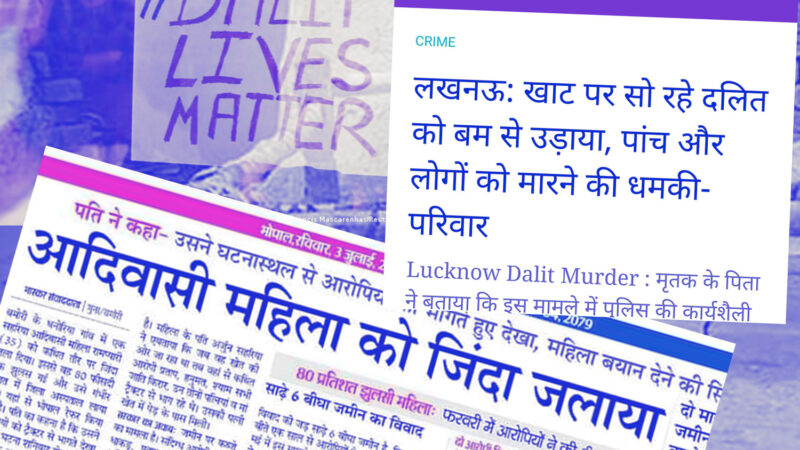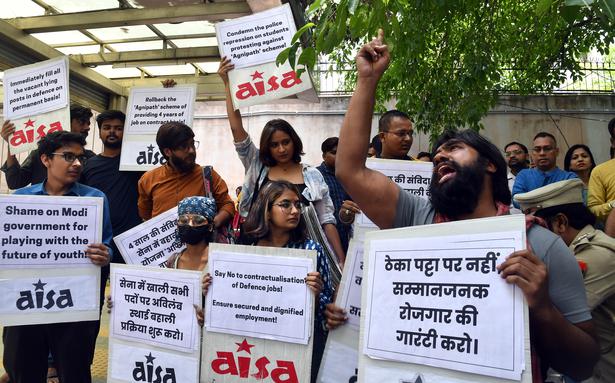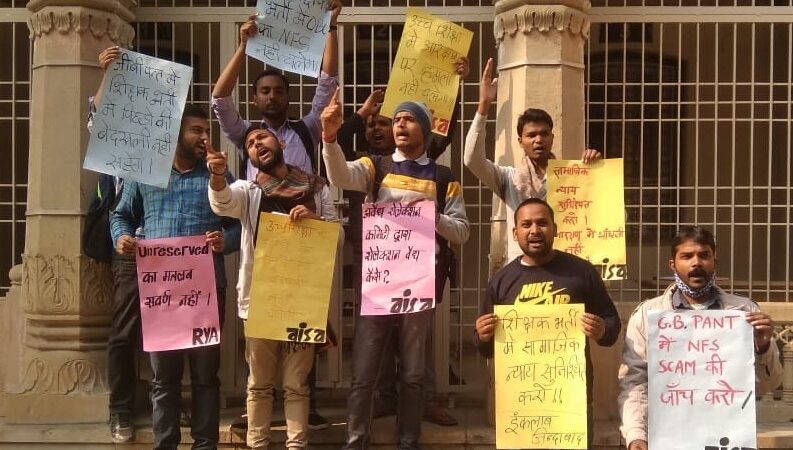AISA PARCHA on recent crises of JNU-SFI Unit.
Before the ongoing debate in JNU, initiated by CPI(M)’s support for Pranab Mukherjee, can proceed, one clarification is needed from the SFI-JNU.Students need to know, what exactly is ‘SFI-JNU’? Are we debating with the JNU unit of the SFI, which is claimingfederal independence to take positions in opposition to the SFI national body, which is the CPI(M)’s student wing?Or are we debating with a new entity called ‘SFI-JNU’, which is now taking birth, attempting to carve out a new ideological foundation distinct from that of the CPI(M), as a JNU-specific response to SFI’s electoral defeat in JNUSU elections?
Ideological Rethink Should Not Be Based on Electoral Outcomes and Convenience
The SFI-JNU, in 2012 July, decided to adopt a critical posture towards CPI(M)’s stands on Pranab Mukherjee, TPC,Singur-Nandigram, and AFSPA. What prompted this rethink? Let us examine the reasons given by the SFI-JNU.According to SFI-JNU, it could not afford to “defend unconvincing political decisions in public” nor “remain silent,”because “in a left-leaning campus like JNU”, organisations like AISA and the common students too, demand an answerfrom the SFI, and take SFI to task for “doublespeak” if they defend the CPI(M)’s indefensible positions. In particular, theSFI-JNU cites the “adverse electoral trend” experienced by them in 2007 in the wake of Singur-Nandigram, and again in2012, as a the main factor in leading them to realise that elections in JNU cannot be won by defending the politicalpositions adopted by the CPI(M) which are rejected by the “progressive and democratic-minded students.”The question that arises is: what took the SFI-JNU so long to realise and oppose the right-opportunist trends in theCPI(M)? Why did the horrific bloodshed of peasants unleashed by the CPI(M)-led West Bengal Government at Singur andNandigram in 2006-07, not prompt the SFI-JNU to rethink, until faced with electoral defeat in JNU?Ideological positions and introspection cannot be a matter of convenience, prompted by electoral results and thecompulsions of a taking a publicly acceptable posture in a ‘Left-leaning campus like JNU’. While we have welcomed SFI’sbelated and partial acknowledgement of the grievously wrong positions of CPI(M) that it hitherto defended, we would alsolike to respectfully underline that ideological realisation and rectification need to go much deeper.
Sectarianism and Opportunism Have Gone Hand in Hand
SFI-JNU (in its leaflet dt. 9 July 2012) accuses CPI(ML) and AISA of indulging only in ‘CPIM-bashing,’ rather than onmobilizing mass movements and building Left unity. Before we examine this question beyond the campus, let uslook at JNU’s own experience.SFI-JNU always hitherto dismissed AISA’s principled critique on Singur-Nandigram, AFSPA, Nuke Deal and otherissues as ‘CPI(M)-bashing.’ But hasn’t SFI-JNU’s own leaflet of 7 July 2012 admitted that its own change of posture onCPI(M)’s policies came about because it faced questions from AISA in JNU, questions that the progressive section of JNUendorsed and supported?We would like to ask: had there been no AISA to ask questions on Singur, Nandigram, AFSPA, or TPC,wouldn’t SFI-JNU’s introspection on these issues have been delayed or never arisen? After all, isn’t it true thatoutside JNU, the SFI nationally is yet to arrive at any such realization and rethink? So, it should be honestly admittedthat AISA’s critique of CPI(M), far from being mindless ‘bashing’ that damaged the Left, has helped shape aconstructive Left debate, that pushed elements within the SFI to realise the need to oppose CPI(M)’s right wingdeviations.Throughout the period between 2004-2012, the AISA-led JNUSU has always mobilized students on a positive Leftdemocratic agenda, resisting right-wing policies and forces, and expanding the space for the Left in JNU. But the campushas witnessed, time and again how the SFI, far from adopting the non-sectarian broadness they talk of now,opposed and undermined several struggles (such as the anti-Nestle struggle, workers’ struggle, black flags toManmohan Singh, and the struggle against distortion of OBC reservation in JNU) led by the AISA-led JNUSU.Today, the SFI-JNU is distancing itself from the burden of CPI(M)’s right-deviation; but surely an honest introspection woulddemand that they examine their own sectarian and right-wing deviations in JNU, that led them to defend Nestle andManmohan Singh, and withdraw from the workers’ struggle? None of these struggles had any anti-SFI or anti-CPI(M)content; SFI-JNU could easily have decided to support and participate in these struggles. Instead, SFI-JNU pitteditself against these movements, and got rejected by students. The SFI-JNU’s actions in JNU were not only an outcomeof their sectarianism towards AISA, but also a reflection of the overall rightward framework of the CPI(M). Theirwelcome to Nestle in JNU was akin to Buddhadeb’s welcome to MNCs in West Bengal; and their opposition to showingblack flags to Manmohan Singh was influenced by the CPI(M)’s alliance with the Manmohan-led Government.Not only that, when AISA won the Presidential post in 2004-05, and VP and GS posts in 2006, on the basis of theseprogressive struggles that SFI had tried to vilify, SFI-JNU’s leadership wrote articles in the CPI(M)’s organ People’sDemocracy(PD), alleging that that AISA won as a result of an unprincipled ‘mahajot’ with right wing organizations, ratherthan recognizing that progressive democratic opinion on campus had approved of AISA’s positive Left agenda for students,and disapproved of SFI’s misplaced opposition to this agenda. The sectarianism was such that SFI-JNU could not evenwelcome a Left victory on the post of JNUSU President, simply because it was AISA which won that post!On SFI-JNU’s Recent PositionsP.T.O.10.7.12We would also like to remind that in 2007, AISA’s JNUSU office bearers even organized a protest march against firingat CPI(M)-supported peasants at Khammam in Andhra Pradesh; it is SFI-JNU which, due to its own sectarianism, andfearing allegations of doublespeak on Nandigram and police firing on peasants, boycotted the march.
Electoral Victory is Not the Only Yardstick to Judge Mass Movements
According to SFI-JNU, CPI(ML) has suffered erosion of its support in Bihar because it does not mobilize massmovements and is sectarian towards CPI(M). Is this even remotely borne out by facts?The CPI(ML) was born waging struggles of dalit agricultural labourers against feudal forces, and for dignity and politicalassertion; and has continued the mass struggles for land reform, against corruption and scams by various regimes,against political assassinations by RJD and NDA regimes, for implementation of MNREGA, for justice for Rupam Pathakwho was raped by a BJP MLA, etc. It is due to these mass struggles that CPI(ML) is the leading Left force in Bihar, whileother Left parties lament their failure to make an impact in the Hindi heartland. While CPI(ML) has always sought Left unitywith CPI and CPI(M), both in these movements and in elections, the latter have, as a rule and with few exceptions, optedfor bourgeois partners like RJD or LJP rather than Left unity! In the name of ‘non-sectarian’ approach, should CPI(ML) havejoined CPI and CPI(M) in supporting the RJD rule in Bihar, even when it patronized the mass murderers Ranveer Sena andcriminal mafia politicians like Shahabuddin? CPI(M) even betrayed its own martyred Comrade Ajit Sarkar by goingfor an alliance with his killer, Pappu Yadav. Should CPI(ML) have similarly gone for an alliance with the RJDand campaigned, as CPI(M) did, for Comrade Chandrashekhar’s killer Mohd. Shahabuddin? And should CPI(ML)have betrayed Bathani’s martyrs by allying with RJD whose Government and police deliberately allowed theRanveer Sena to commit massacres with impunity?In the last elections, CPI(ML), whom SFI-JNU accuses of being sectarian, was in alliance with CPI and CPI(M) inBihar! In spite of heroic mass movements, sacrifices, and principled Left unity, many times ruling class politics mayremain dominant. Mass movements are not always ‘rewarded’ with electoral victory! SFI-JNU mentions CPI(M)’s strugglesagainst casteism in Tamil Nadu. But these struggles, too, did not lead to CPI(M)’s electoral victory in TN. Rather, theCPI(M), in order to win seats, has gone for an alliance with Jayalalithaa: the same Jayalalithaa who has presided over thedastardly and politically dictated, police-led, massacre of dalits at Paramakudi. (Perhaps due to Jayalalithaa’s support forthe Koodankulam Nuke Plant, CPI(M) is opposing the struggle of dalits and poor fisher-people against the Nuke Project.While SFI-JNU failed to join the JNUSU’s protest in solidarity with the anti-Nuke struggle at Koodankulam, recently, theSFI-JNU even organized a Public Meeting to covertly garner support for the Koodankulam Nuke Plant!)Once again, we reiterate that CPI(M)’s debacle in West Bengal is not comparable with Left defeats in other parts ofthe country. That debacle was not an ordinary defeat that Left comrades must take in their stride – it was a punishment forits adoption of right-wing and repressive policies. The CPI(ML) does introspect on how to overcome electoral challenges– but thankfully, we do not have to correct any right-wing policy deviation that has crept into our line!SFI-JNU contends that the dedicated Left cadres in CPI(M) outnumber those of the CPI(ML), and they cite severalstruggles by these cadres in many states. Comrades, we are not in any way questioning the integrity or fightingspirit of those CPI(M) cadres. The point is, that right-opportunism leads the CPI(M) to betray those very samecadres. As we have pointed out, when CPI(M), thanks to its overall opportunist tactical line, goes for an alliance with theanti-dalit Jayalalithaa, they betray their own cadres’ struggle against casteism in TN. When they go for an alliance withPappu Yadav, they betray their martyred Comrade Ajit Sarkar.
Rejection of Left Adventurism Cannot Mean Support for State’s War on Tribals
SFI-JNU alleges that AISA is silent on Left-adventurism. May we remind them that neither AISA nor CPI(ML) are silenton Left-adventurist trends, especially on the violence by the latter on common people or Left cadres. Not only have wecategorically condemned their violence on CPI(M) cadres, it is well known that CPI(ML) has paid a high cost in cadreskilled by Maoist groups in Bihar and Jharkhand. But we, unlike CPI(M) and SFI-JNU, do not lose our sense of proportionand Left principles on this question. We maintain that State violence on adivasis and peasants, and crackdown on dissent,in the name of ‘fighting Maoism,’ is the main enemy. Whereas the CPI(M) has supported and implemented OperationGreen Hunt in Bengal, while SFI in JNU has, not long ago, even refused to support a joint struggle for lifting of administration’sban on a student outfit, on the grounds that it was a ‘pro-Maoist’ outfit! And SFI-JNU boycotted the JNUSU’s initiativesagainst the witch-hunt of Binayak Sen.Anyone interested in CPI(ML)’s detailed position on these questions can read Comrade Arindam Sen’s booklet,‘Green Hunt is Witch-Hunt.’(serialised in Liberation since December 2009 issue)AISA has never been silent on Left adventurist acts. But why have SFI-JNU’s leaflets for years past, prior to July2012, always been completely silent on the dangers of right-opportunism in the Indian Left movement?The answer is simple. CPI(M)’s stance was that right-opportunism was represented by CPI. But increasingly, therehas been a convergence of CPI’s and CPI(M)’s positions and tactics, including right-opportunist partnership with Congressat the Centre. Therefore the CPI(M) directed all its fire in misplaced opposition only to ‘Left adventurism’, mischievouslyeven branding CPI(ML) as the same. And SFI-JNU branded all AISA’s positive initiatives (like workers’ movement) andcritique of CPI(M) (on Singur-Nandigram, AFSPA, Nuke Deal, etc) as Left adventurism and ‘infantile disorder’!2It is well known that the bulk of Lenin’s writings comprise his polemic with the right-opportunists in the Russiancommunist movement, while he also cautioned against Left adventurism. Lenin never equated both the dangers – rather healways held that anarchism was “a kind of penalty for the opportunist sins” of the communist movement, and the “reverseside of opportunism”. Thereby Lenin always maintained that fighting right opportunism was the primary task for revolutionaries,and Left adventurism could never be contended without a resolute struggle against right opportunism.SFI-JNU is now distancing from some of the right-wing positions taken by CPI(M) – we hope it dawns on them tointrospect on the grievous right-wing deviation that the CPI(M) and even SFI-JNU have indulged in by supporting the state’swar on adivasis and its crackdown on dissent and banning of groups in the name of fighting Maoism.
CPI(M) Has Always Shunned Dissent
When we remind SFI-JNU of the criticisms by Prabhat Patnaik, Ashok Mitra, or Rezzak Mollah, or those of Left Frontpartners like RSP, FB and CPI, we do so not to ‘seek credibility’ for our own critique, but merely to point out thatCPI(M) does not just reject critiques made by a Left party like CPI(ML), but even ridicules those (partial, hesitant)advices or critiques made by its own members and allies.At the same time, we also engage with the shortcomings and palpable weaknesses of those critiques. In the case ofPrabhat Patnaik, CPI(ML) has also, while welcoming his critique of CPI(M), engaged with that critique and pointed out theweakness and blind spots inherent in that critique ( See Com. Dipankar Bhattacharya’s article on Left Resurgence inEPW Vol – XLVI No. 47, November 19, 2011).SFI-JNU has refused to defend CPI(M)’s official stand on RMP Comrade TPC’s killing, and Prabhat Patnaik hasexpressed his moral anguish at the murder. That’s a welcome change. But may we remind them that CPI(M)’s brutalviolence against Left activists who chose to criticize it, is in no way new or unusual. In 1993, CPI(M) cadreshacked five agrarian labourers to death at Karanda village near Bardhaman town on 31 May, for leaving CPI(M) to joinCPI(ML). There is a Hindi saying, ‘poot ke panv palne mein’: in 1979, in the euphoric early years of the CPI(M)-ledGovernment’s rule in West Bengal, thousands of dalit Namashudra refugees from Bangladesh were massacred at Marichjhapi,in order to evacuate an island in the Sunderbans where they had settled.Take even the case of Naxalbari. CPI(M) was entitled to differ with the political line taken by Comrade Charu Mazumdar.But can we forget that the Government in which CPI(M) shared power, fired bullets on its own peasant comrades atNaxalbari who had launched a struggle against landlords? How can that brutal bloodshed and repression be condoned?Is it not the long-standing policy of willful amnesia and silence on the massacres and murders at Naxalbari,Marichjhapi, Karanda and so many more, that finally allow a Nandigram massacre, and a murder of ComradeTPC to happen?
Broad Unity of Left Forces and Solidarity with People’s Struggles
SFI-JNU has mentioned the need for broad Left unity on people’s issues and struggles. The All India Left Coordination(AILC) precisely shares such a perspective, where the varying history and programmatic perspective of different groupshas not been a barrier to developing a shared platform of united struggles.SFI-JNU has mentioned the need for broad, non-sectarian solidarity with a range of people’s struggles, irrespective ofwhich party or group is leading the struggle. For SFI-JNU, this may be a new perspective and attitude, but not for JNU’s Leftdemocratic students. AISA has already been expressing such non-sectarian solidarity with people’s movements for long.Be it AFSPA or POSCO or Jaitapur or Koodankulam, it is AISA which has visited these movements, and expressedsolidarity, irrespective of which group is leading these struggles! Now that SFI-JNU too would like to participate in suchexpressions of solidarity, they are very welcome. Join us in doing so comrades!
(AISA Poster, dt: 10 July 2012)






That is definitely genuinely exciting, You are quite specialist blog writer. I’ve truly joined up with your own give food to and check toward seeking more of your terrific posting. In addition, I distributed your site around my social networking sites